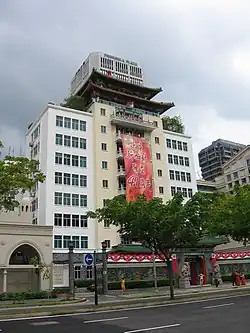Singapore Chinese Chamber of Commerce and Industry
The Singapore Chinese Chamber of Commerce and Industry (SCCCI; Chinese: 新加坡中华总商会; pinyin: Xīnjīapō Zhōnghuá Zǒngshānghuì) is a business chamber located in Singapore.
新加坡中华总商会 | |
| Formation | 1906 |
|---|---|
| Founded at | Singapore |
| Type | Chamber of commerce |
| Purpose | Promote commercial interest of Chinese community, Chinese culture and values |
| Headquarters | SCCCI Building |
| Location | |
| Coordinates | 1.29322°N 103.85027°E |
Membership (2022) | 4,000 corporate members, 150 trade associations |
President | Kho Choon Keng |
| Website | www |
Formerly called | General Chinese Trade Affairs Association Singapore Chinese Chamber of Commerce |

The chamber was originally created to protect and promote the commercial interests of the Chinese community in Singapore, but it also played a role in the social, cultural and educational spheres to protect Chinese customs and values. It has raised funds to build schools and provided assistance to the community in times of crisis.[1][2]
The organization has a membership of more than 4,000 companies and over 150 trade associations in Singapore as of 2016.[3]
History
The Singapore Chinese Chamber of Commerce and Industry (SCCCI) was first established in 1906 as the General Chinese Trade Affairs Association by prominent members of the Chinese community. Its original purpose was to look after the trading interests of the Chinese business community, resolve and mitigate differences among the different clans and champion the Chinese community in Singapore. The first president was Goh Siew Tin.[4]
In 1912, it was renamed as Singapore Chinese Chamber of Commerce when the Republic of China was formed.[5]
In 1951, the chamber lobbied the British colonial government to grant citizenship to Chinese immigrants who had stayed in Singapore for eight years and in 1957, the government approved the proposal.
In February 1962, remains belonging to civilian victims of the Japanese occupation were unearthed in areas like Siglap, Changi and Bukit Timah. The chamber undertook the responsibility of gathering the remains. It also helped in establishing the Civilian War Memorial at Beach Road in 1967.
In 1962, the chamber started constructing their building at Hill Street and the building was officially opened on 20 September 1964 by Prime Minister Lee Kuan Yew.[6]
In 1966, the chamber set up the Singapore Chinese Chamber of Commerce Foundation to provide financial assistance to the needy and scholarships to deserving students, and to support cultural activities and public educational political campaigns.[7]
In 1977, it was renamed again to Singapore Chinese Chamber of Commerce and Industry, to reflect its expanded scope of both commerce and industry.[4]
In 1991, the SCCCI organised and held the inaugural World Chinese Entrepreneurs Convention (WCEC) in Singapore which was attended by more than 700 delegates from 30 countries.[8][9]
During the second WCEC in 1993, Singapore's prime minister Lee Kuan Yew suggested a Internet enabled network of ethnic Chinese businesses worldwide accessible to the various Chinese chambers of commerce in the world.[10] With the help of Institute of Systems Science and Netcentre and a financial grant from the National Science and Technology Board, the SCCCI created the World Chinese Business Network (WCBN). The WCBN was launched on 8 December 1995.[10]
- 1997: The SCCCI's first Annual Internet Commerce Conference is organized. The event is now known as the Infocomm Commerce Conference.
- 2001: The Sun Yat Sen Nanyang Memorial Hall is reopened to members of the public and foreign visitors as a new tourist attraction and national education centre after four years of renovation and restoration.
- 2006: The SCCCI officially launches the Enterprise Development Center@SCCCI (EDC@SCCCI) and Chiye Tong, the Chinese version of the EnterpriseOne portal, a one-stop online information service for small- and medium-sized enterprises.
- 2006: The SCCCI unveiled the Dendrobium Singapore Chinese Chamber of Commerce and Industry as its floral symbol.[11]
- 2006: The SCCCI 100th Anniversary Commemorative Stamp Issue is launched. It is the first ever set of postage stamps issued by Singapore Post on behalf of a local business organisation.
SCCCI Building
The SCCCI Building is located on Hill Street, facing the Armenian Church. The headquarters of the organisation has been sited here since the early twentieth century.[1]
Before 1964, the headquarters was a two-story building. The construction of the current building started in 1962 and the completed building was officially opened on 20 September 1964. The architecture is a blend of Chinese and Western styles.[6]
See also
References
- Singapore's 100 Historic Places. 2002. p. 11. ISBN 981-4068-23-3.
{{cite book}}:|work=ignored (help) - Lynn Seah, "SCCCI's Centennial Celebrations", The Sunday Times, 22 October 2006
- Chia Yan Min (24 September 2016). "Chinese chamber 'has evolved with Singapore': PM Lee". The Straits Times.
- "Singapore Chinese Chamber of Commerce is founded". History SG. National Library Board Singapore.
- "President pays a tribute to pioneers". eresources.nlb.gov.sg. 15 March 1966. p. 12. Retrieved 20 September 2023.
- Naidu Ratnala Thulaja. "Hill Street". Singapore Infopedia. National Library Board Singapore.
- "S'pore chamber sets up a foundation". The Straits Times. Singapore. 31 March 1966. Retrieved 22 June 2022.
- "S'pore to host first-ever world Chinese entrepreneurs' meet". The Straits Times. 6 August 1991. p. 36.
- "Lesson for our Chinese businessmen : Know Chinese or be left out". The Straits Times. 16 August 1991. p. 34.
- Tan, Tammy (9 December 1995). "World's first on-line Chinese business network launched". The Straits Times. p. 3.
- "100th Anniversary of Singapore Chinese Chamber of Commerce and Industry stamp". www.roots.gov.sg. Retrieved 20 June 2022.